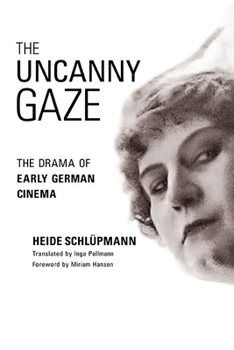The Uncanny Gaze: The Drama of Early German Cinema
(Part of the Women and Film History International Series)
Heide Schl pmann's classic study of early German cinema was published in German as Unheimlichkeit des Blicks: Das Drama des Fr hen deutschen Kinos in 1990. For the first time in English, this translation makes available her feminist examination of German cinema and Germany in the sociopolitical context of Wilhelmine society. By examining then-unknown pre-World War I narrative films, this study paints a picture of the conflicted early years of the German cinema. During this period cinema and film production were able to develop independently from the cultural bourgeoisie and relied on those forces excluded from high "culture" technology, business, performers, showmen, and actors. In cinema, the dime novel and kitsch were exhibited for all, and the internationalism of modernity prevailed over the prevailing nationalism of the period.
Featuring a foreword by film scholar Miriam Hansen and a new afterword by Schl pmann, this volume performs a critical perusal of film commentary and offers an in-depth look at little-known films in early German cinema.





